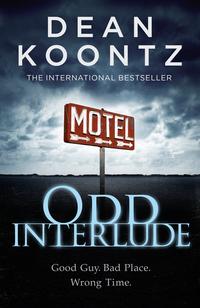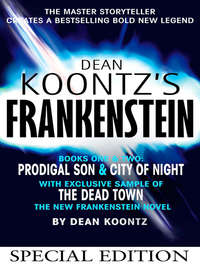
Полная версия
Odd Thomas
Although from the far side of the doorway I had been unable to discern one scintilla of this room, I could look out from within it and see the hallway in normal light, unobstructed. This view shed no more illumination into the room than would have a painting of a sunny landscape.
I half expected to find that Fungus Man had returned and that he was staring at the only part of me now visible from out there: my hooked fingers desperately clutching the casing. Fortunately, I was still alone.
Having discovered that I could see the exit to the hall and therefore could find my way out, I let go of the doorway. I eased entirely into this lightless chamber and, turning away from the sight of the hall, became at once as blind as I was deaf.
Without either sound or vision, I quickly grew disoriented. I felt for a light switch, found it, flicked it up and down and up again without effect.
I grew aware of a small red light that I was certain hadn’t been there a moment earlier: the murderous red of a sullen and bloody eye, though it was not an eye.
My sense of spatial reality and my ability to gauge distance with accuracy abandoned me, for the tiny beacon seemed to be miles from my position, like the mast light of a ship far away on a night sea. This small house, of course, could not contain such a vastness as I imagined lay before me.
When I let go of the useless light switch, I felt as unnervingly buoyant as a hapless drunkard inflated by the fumes of alcohol. My feet seemed not quite to touch the floor as I determinedly approached the red light.
Wishing that I’d had a second scoop of coconut cherry chocolate chunk while I’d had the chance, I took six steps, ten, twenty. The beacon didn’t increase in size and seemed in fact to recede from me at precisely the speed at which I approached it.
I stopped, turned, and peered back at the door. Although I had made no progress toward the light, I had traveled what appeared to be approximately forty feet.
Of more interest than the distance covered was the figure now silhouetted in the open door. Not Fungus Man. Backlit by the hallway light stood ... me.
Although the mysteries of the universe do not greatly frighten me, I’ve not lost my capacity for astonishment, amazement, and awe. Now, across the keyboard of my mind played arpeggios of those three sentiments.
Convinced that this wasn’t a mirror effect and that I was in fact gazing at another me, I nevertheless tested my certainty by waving. The other Odd Thomas didn’t return my wave, as a reflection would have done.
Because I stood submerged in this swampish blackness, he could not see me, and so I tried to shout to him. In my throat, I felt the quiver of strummed vocal chords, but if sound was produced, I could not hear it. Most likely he, too, was deaf to that cry.
As tentatively as I had done, this second Odd Thomas reached into the palpable dark with one questing hand, marveling as I had done at the illusion of amputation.
This timid intrusion seemed to disturb a delicate equilibrium, and abruptly the black room shifted like the pivot mountings of a gyroscope, while the red light at the center remained fixed. Flung by forces beyond my control, much as a surfer might be tossed from his board in the collapsing barrel of a mammoth wave, I was magically churned out of that weird chamber and—
—into the drab living room.
I found myself not tumbled in a heap, as I might have expected to be, but standing approximately where I had stood earlier. I picked up one of the paperback romance novels. As before, the pages made no noise, and I could hear only those sounds of internal origin, such as my heart beating.
Glancing at my wristwatch, I convinced myself that this was, indeed, earlier. I had not merely been magically transported from the black room to the living room but also had been cast a few minutes backward in time.
Since I had a moment ago seen myself peering into the blackness from the hall doorway, I could assume that by the grace of some anomaly in the laws of physics, two of me now existed simultaneously in this house. There were the me here with a Nora Roberts novel in my hands and the other me in some nearby room.
At the start, I warned you that I lead an unusual life.
A great deal of phenomenal experience has fostered in me a flexibility of the mind and imagination that some might call madness. This flexibility allowed me to adjust to these events and accept the reality of time travel more quickly than you would have done, which does not reflect badly on you, considering that you would have been wise enough to get the hell out of the house.
I didn’t flee. Neither did I at once retrace my original route to Fungus Man’s bedroom—with its scatter of underwear and socks, the half-eaten raisin Danish on the nightstand—or to his bathroom.
Instead, I put down the romance novel and stood quite still, carefully thinking through the possible ramifications of encountering the other Odd Thomas, responsibly calculating the safest and most rational course of action.
Okay, that’s bullshit. I could worry about the ramifications, but I didn’t have either enough phenomenal experience or the brain power to imagine all of them, let alone to figure out the best way to extract myself from this bizarre situation.
I’m less skilled at extracting myself from trouble than I am at plunging into it.
At the living-room archway, I cautiously peeked into the hallway and spotted the other me standing at the open door of the black room. This must have been the earlier me that had not yet crossed that threshold.
If all sound had not by now been entirely suppressed within the house, I would have been able to call out to that other Odd Thomas. I’m not sure that would have been prudent, and I’m grateful that the circumstances prevented me from hailing him.
If I had been able to speak to him, I’m not certain what I would have said. How’s it hanging?
Were I to walk up to him and give him a narcissistic hug, the paradox of two Odd Thomases might at once be resolved. One of us might disappear. Or perhaps both of us would explode.
Big-browed physicists tell us that two objects cannot under any circumstances occupy the same place at the same time. They warn that any effort to put two objects in the same place at the same time will have catastrophic consequences.
When you think about it, a lot of fundamental physics is the solemn statement of the absurdly obvious. Any drunk who has tried to put his car where a lamppost stands is a self-educated physicist.
Assuming that two of me could not coexist without calamity, not charmed by the prospect of exploding, I remained in the archway, watching, until the other Odd Thomas stepped across the threshold into the black room.
You no doubt suppose that upon his departure the time paradox had been resolved and that the crisis described by those doomsaying scientists was at an end, but your optimism is a result of the fact that you are happy in your world of the five standard senses. You are not, as I am, compelled to action by a paranormal talent that you do not understand and cannot fully control.
Lucky you.
As soon as that Odd Thomas stepped for the first time across the threshold into the lightless chamber, I walked directly to the door that he’d left open behind him. I could not see him, of course, out there in the mysteries of the black room, but I assumed that soon he would turn, look back, and see me—an event that in my experience had already come to pass.
When I judged that he’d spotted the sullen red light and had progressed about twenty paces toward it, when he’d had time to look back and see me standing here, I checked my wristwatch to establish the beginning of this episode, reached into the blackness with my right hand, just to be sure nothing felt different about that strange realm, and then I crossed the threshold once more.
CHAPTER 11
MY GREATEST CONCERN, ASIDE FROM exploding and aside from being late for dinner with Stormy, was that I might find myself caught in a time loop, doomed to follow myself repeatedly through Fungus Man’s house and through the door into the black room, over and over for all of eternity.
I’m not sure that such a thing as a time loop is possible. The average physicist might laugh smugly at my concern and charge me with ignorance. This was my crisis, however, and I felt free to speculate without restraint.
Rest assured that no time loop became established: The remainder of my story will not consist of endless repetitions of the events immediately heretofore described—although there are reasons that I wish it did.
Less hesitant on my second visit to the black room, I strode more boldly, yet with that same queasy-making buoyancy, toward the crimson beacon at the center of the chamber. This mysterious lamp seemed to shed a more ominous light than it had previously, though as before it did not relieve the gloom.
Twice I glanced back toward the open door to the hallway but didn’t see myself on either occasion. Nevertheless, I experienced that sudden gyroscopic spin, as before, and I was again churned out of that strange chamber—
—this time into the hot July afternoon, where I found myself walking out of the shadows under the carport, into sunshine that stabbed like fistfuls of golden needles at my eyes.
I halted, squinted against the glare, and retreated to the gloom.
The profound silence that reigned in the house did not extend beyond those walls. A dog barked lazily in the distance. An old Pontiac with a knocking engine and a squealing fan belt passed in the street.
Certain that I had spent no more than a minute in the black room, I consulted my wristwatch again. Apparently I had been not only cast out of the house but also five or six minutes into the future.
Out in the half-burnt yard and in the bristling weeds along the chain-link fence between this property and the next, cicadas buzzed, buzzed, as though the sunlit portion of the world were plagued by myriad short circuits.
Many questions arose in my mind. None of them concerned either the benefits of a career in tires or the financial strategy by which a twenty-year-old short-order cook might best begin to prepare for his retirement at sixty-five.
I wondered if a man living behind a perpetual half-wit smile, a man incapable of keeping a neat house, a man conflicted enough to split his reading time between skin magazines and romance novels, could be a closet supergenius who, with electronic components from Radio Shack, would be able to transform one room of his humble home into a time machine. Year by year, weird experience has squeezed all but a few drops of skepticism from me, but the supergenius explanation didn’t satisfy.
I wondered if Fungus Man was really a man at all—or something new to the neighborhood.
I wondered how long he had lived here, who he pretended to be, and what the hell his intentions were.
I wondered if the black room might be not a time machine but something even stranger than that. The time-related occurrences might be nothing more than side effects of its primary function.
I wondered how long I was going to stand in the shade of the sagging carport, brooding about the situation instead of doing something.
The door between the carport and the kitchen, through which I had initially entered the house, had automatically locked behind me when I had first gone inside. Again I popped the latch bolt with my laminated driver’s license, pleased to know that finally I was getting something back for the state income taxes that I had paid.
In the kitchen, the browning banana peel continued to shrivel on the cutting board. No time-traveling housemaid had attended to the dirty dishes in the sink.
Softcore pornography and romance novels still littered the living room, but when I had crossed halfway to the hallway arch, I stopped abruptly, struck by what had changed.
I could hear normally. My footsteps had crackled the ancient linoleum in the kitchen, and the swinging door to the living room had squeaked on unoiled hinges. That vortex of silence no longer sucked all sound out of the house.
The air, which had been freezing, was now merely cool. And getting warmer.
The singular foul odor that smelled like not-exactly-burning-electrical-cord blended with not-exactly-ammonia-coal-dust-nutmeg had grown far more pungent than before but no easier to identify.
Ordinary instinct, rather than any sixth sense, told me not to proceed to the black room. In fact, I felt an urgent need to retreat from the nearby hallway arch.
I returned to the kitchen and hid behind the swinging door, holding it open two inches to see from whom, if anyone, I had fled.
Only seconds after I had reached concealment, bodachs swarmed out of the hallway into the living room.
CHAPTER 12
A GROUP OF BODACHS ON THE MOVE sometimes brings to mind a pack of stalking wolves. On other occasions they remind me of a pride of slinking cats.
Pouring through the hallway arch into the living room, this particular swarm had an unnerving insectile quality. They exhibited the cautiously questing yet liquid-swift progress of a colony of cockroaches.
They came in roachlike numbers, too. Twenty, thirty, forty: They quivered into the room as silent and as black as shadows but, unlike shadows, they were untethered from any entities that might have cast them.
To the ill-fitted front door, to the poorly caulked living-room windows, they streamed as if they were billows of soot drawn by a draft. Through crack and chink, they fled the house, into the sun-drenched afternoon of Camp’s End.
Still they swarmed out of the hallway: fifty, sixty, seventy, and more. I had never before encountered so many bodachs at one time.
Although, from my position in the kitchen, I couldn’t see around the living-room archway and down the hall, I knew where the intruders must have entered the house. They had not arisen spontaneously from among the gray dust balls and the moldering socks under Fungus Man’s unmade bed. Nor had they manifested out of a boogeyman-infested closet, out of a bathroom faucet, from the toilet bowl. They had arrived in the house by way of the black room.
They seemed eager to leave this place behind them and to explore Pico Mundo—until one of them separated from the churning swarm. It abruptly halted in the center of the living room.
In the kitchen, I considered that no available cutlery, no toxic household cleanser, no weapon known to me would wound this beast that had no substance. I held my breath.
The bodach stood so hunched that its hands, if they were hands, dangled at its knees. Turning its lowered head from side to side, it scanned the carpet for the spoor of its prey.
No troll, crouched in the darkness beneath its bridge, relishing the scent of a child’s blood, had ever looked more malevolent.
At the gap between jamb and door, my left eye felt pinched, as though my curiosity had become the serrated jaws of a vise that held me immobile even when it seemed wise to exit at a sprint.
As others of its kind continued to roil and ripple past it, my nemesis rose from its crouch. The shoulders straightened. The head lifted, turned slowly left, then right.
I regretted using peach-scented shampoo, and suddenly I could smell the meaty essence that the greasy smoke from the griddle had deposited upon my skin and hair. A short-order cook, just off work, makes easy tracking for lions and worse.
The all but featureless, ink-black bodach had the suggestion of a snout but no visible nostrils, no apparent ears, and if it had eyes, I could not discern them. Yet it searched the living room for the source of whatever scent or sound had snared its attention.
The creature appeared to focus on the door to the kitchen. As eyeless as Samson in Gaza, it nevertheless detected me.
I had studied the story of Samson in some detail, for he was a classic example of the suffering and the dark fate that can befall those who are ... gifted.
Standing very erect now, taller than me, the bodach was an imposing figure in spite of its insubstantiality. Its bold poise and a quality of arrogance in the lift of its head suggested that I was to it as the mouse is to the panther, that it had the power to strike me dead in an instant.
Pent-up breath swelled in my lungs.
The urge to flee became almost overpowering, but I remained frozen for fear that if the bodach had not for certain seen me, then even the small movement of the swinging door would bring it at a run.
Grim expectation made seconds seem like minutes—and then to my surprise, the phantom slumped into a crouch once more and loped away with the others. With the suppleness of black silk ribbon, it slipped between window sash and sill, into sunlight.
I blew out my sour breath and sucked sweet air, watching as a final score of bodachs spilled through the hallway arch.
When these last foul spirits had departed for the Mojave heat, I returned to the living room. Cautiously.
At least a hundred of them had passed through this room. More likely, there had been half again that many.
In spite of all that traffic, not one page of any magazine or romance novel had been ruffled. Their passage had left no slightest impression in the nap of the carpet.
At one of the front windows, I peered out at the blighted lawn and the sun-scorched street. As far as I could determine, none of the recently departed pack lingered in the neighborhood.
The unnatural chill in this small house had gone the way of the bodachs. The desert day penetrated the thin walls until every surface in the living room seemed to be as radiant as the coils of an electric heater.
During their passage, that tumult of purposeful shadows had left no stain on the hallway walls. No trace of the burning-electrical-cord smell remained, either.
For the third time, I stepped up to that doorway.
The black room was gone.
CHAPTER 13
BEYOND THE THRESHOLD LAY AN ORDINARY chamber, not infinite in its dimensions, as it had seemed earlier, measuring no more than twelve by fourteen feet.
A single window looked out through the branches of a lacy melaleuca that screened much of the sunlight. Nevertheless, I could see well enough to determine that no source existed for a sullen red light either in the center of this humble space or in any corner.
The mysterious power that had transformed and controlled this room—casting me minutes back, and then forward, in time—was no longer in evidence.
Apparently, this served as Fungus Man’s study. A bank of four-drawer filing cabinets, an office chair, and a gray metal desk with a laminated imitation-wood-grain top were the only furnishings.
Side by side on the wall opposite the desk hung three black- and-white, poster-size photographs that appeared to have been printed on a draftsman’s digital plotter. They were head shots, portraits of men—one with feverish eyes and a gleeful smile, the other two glowering in the gloom.
All three were familiar, but I could at first put a name to only the one with the smile: Charles Manson, the vicious manipulator whose fantasies of revolution and race war had exposed a cancer at the core of the flower-power generation and had led to the demise of the Age of Aquarius. He had carved a swastika on his forehead.
Whoever the other two might be, they didn’t have the look of either Vegas comics or famous philosophers.
Perhaps my imagination, as much as the melaleuca-filtered sunlight, imparted a faint silvery luminescence to each man’s intense gaze. This glow reminded me of the milky radiance that informs the hungry glare of animate corpses in movies about the living dead.
In part to alter the quality of those eyes, I switched on the overhead light.
The dust and disorder that characterized the rest of the house were not in evidence here. When he crossed this threshold, Fungus Man left his slovenliness behind and became a paragon of neatness.
The file cabinets proved to contain meticulously kept folders filled with articles clipped from publications and downloaded from the Internet. Drawer after drawer contained dossiers on serial killers and mass murderers.
Конец ознакомительного фрагмента.
Текст предоставлен ООО «ЛитРес».
Прочитайте эту книгу целиком, купив полную легальную версию на ЛитРес.
Безопасно оплатить книгу можно банковской картой Visa, MasterCard, Maestro, со счета мобильного телефона, с платежного терминала, в салоне МТС или Связной, через PayPal, WebMoney, Яндекс.Деньги, QIWI Кошелек, бонусными картами или другим удобным Вам способом.







